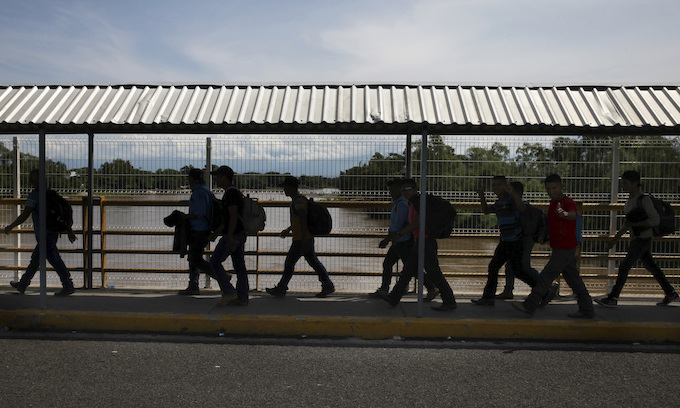One Guatemalan town has nearly emptied of people as they rushed to the U.S.
It wasn’t violence that pushed them to flee, nor family ties that drew them north, according to a new Center for Immigration Studies report. It turns out they just wanted bigger houses.
Todd Bensman, a senior fellow at the center, toured the village of Yalambojoch in the Guatemalan highlands and found its population has been reduced from 1,500 to only about 300. He found no evidence of government persecution, and said the town is so safe that it doesn’t even have a police force.
Instead it was the desire for cash to fund bigger homes that sent hundreds of people on the dangerous trek. He called it “house envy.”
“When my son was growing up, we saw that everyone was building houses and when my son grew up, he said to us, ‘I’m going to go to the U.S. now so I can send you money to build a house too,'” Francisco Santizo, a corn and bean farmer, told Mr. Bensman.
The 20-year-old son did indeed head to the U.S. in the most recent migration surge. He claimed political asylum at the border and was admitted to the U.S. to pursue his case — though Mr. Bensman said his actual reason for coming was to make money, which is not usually considered a valid reason for asylum.
His money, though, is flowing back home, where it’s helping Mr. Santizo and his wife Angelina build a three-story home.
It’s part of a bizarre “keeping up with the Joneses” situation.
Rosa Marcos, another villager, said she would like to build a new home, but her family doesn’t have the money to pay the $8,000 or more the smuggling cartels require to make the trip to the U.S.
One of the most contentious parts of the immigration debate is trying to figure out what spurs waves of illegal immigration.
Immigrant-rights advocates say crime, gang violence and domestic abuse are leading causes for the surges that overwhelmed the U.S.border in 2014, and again in 2018 and 2019.
They argue most of those coming, particularly from Central America, are not illegal immigrants so much as refugees fleeing rough conditions, and that they deserve the chance to claim asylum.
Security experts counter that few actually end up qualifying for asylum, and most of the waves of illegal immigration and traditional migrants seek better jobs or to reunite with family, often already living illegally in the U.S.
Mr. Bensman’s research brings a new angle to that explanation, with envy of neighbors’ successes playing a major role, at least in Yalambojoch.
The money sent back to Guatemala and other countries from the U.S. is known as remittances, and for some countries it’s a major part of their economy. Guatemala reported that remittances in 2019 totaled $10.5 billion, up more than $1.2 billion in just one year. It’s also about 13% of the country’s Gross Domestic Product.
According to the most recent World Bank figures, remittances accounted for more than 20% of El Salvador’s GDP and just less than 20% of Honduras’s GDP.
Together, those were the three countries that made up most of the last decade’s migration surge.
The Trump White House has said it is eyeing action on remittances in order to reduce the incentive for people to come to the U.S. illegally. But no steps have been taken yet.
In Yalambojoch, the big question is whether the hundreds of residents who left will come back.
Consuelo Jorge Domingo, whose husband left for the U.S. and applied for asylum — though he, too, was only seeking a better income — told Mr. Bensman she expects her man to return.
“We wanted a big house for our family like everyone else is building,” she said. “It will be finished soon, and then he will come home and live in it with us.”
But the experience of Mexico suggests that may not happen.
At the height of Mexican illegal immigration to the U.S., the women of Tecalupulco, in Guerrero, Mexico, started a web page begging their husbands to return. Some of the women said they knew the men had started new families in the U.S., leaving their wives and children behind.©
Copyright (c) 2020 News World Communications, Inc.



















Recent Comments